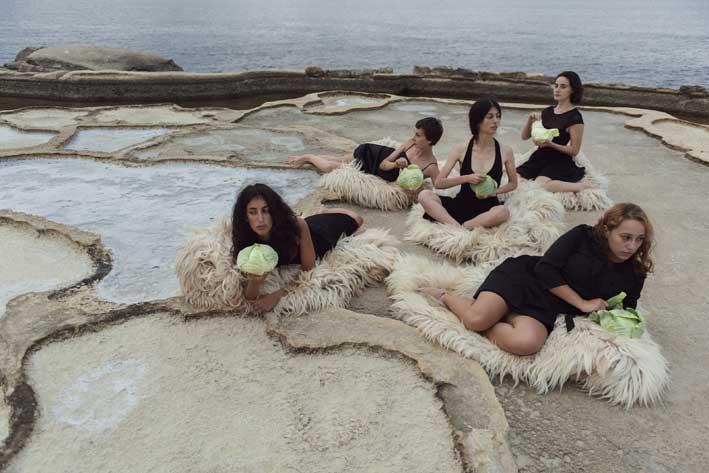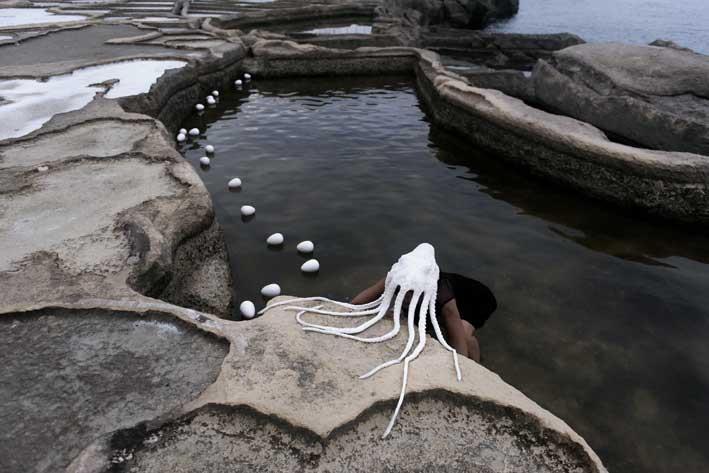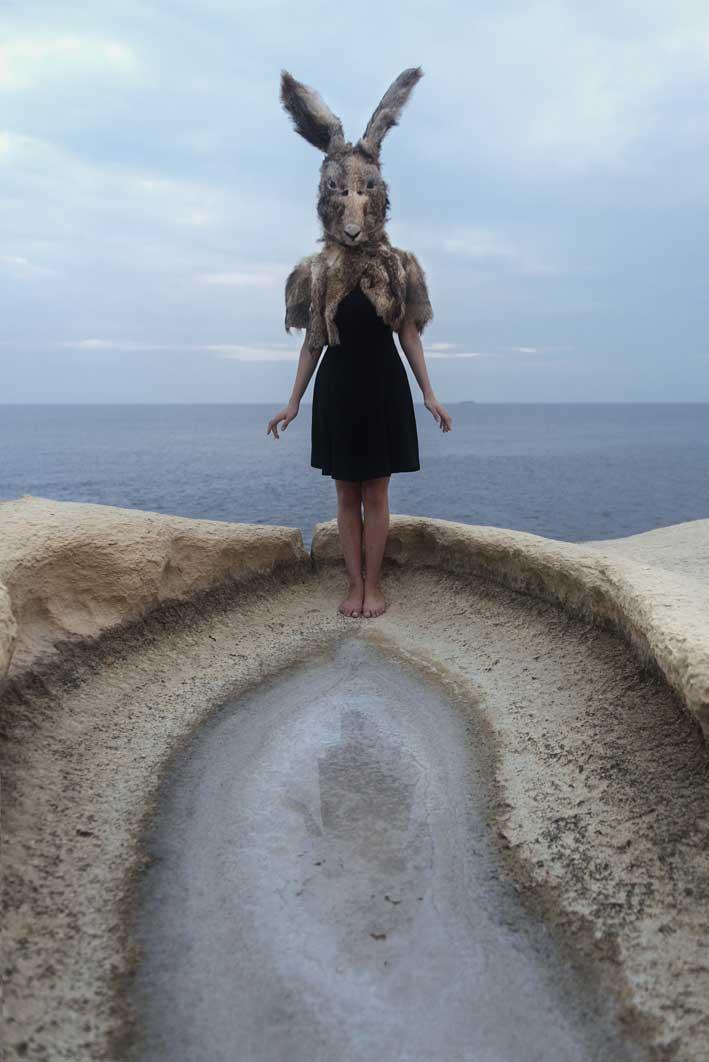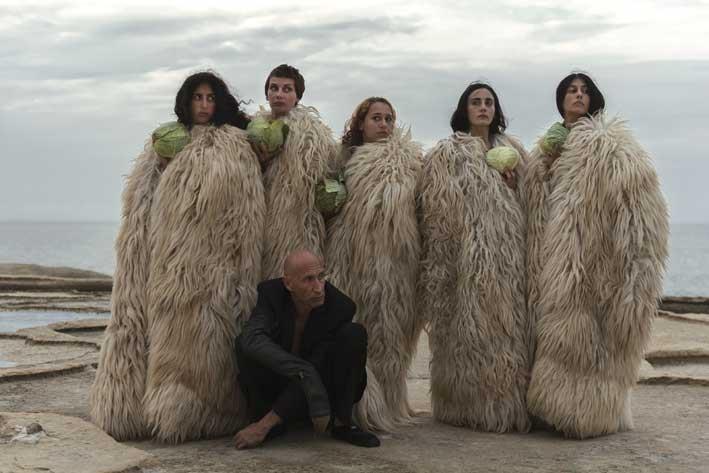The production is an interactive take on the ultimate Maltese meal featuring ingredients from our past, delicacies from the present and an unexpectedly wonderful food experience that audiences of all ages can enjoy. This alluring banquet by the sea will be laced with a mostly non verbal contemporary performance with occasional recitals of newly written poetry by celebrated Maltese poet Immanuel Mifsud.
Under the direction of acclaimed Romanian director Nona Ciobanu, the show stars Paul Portelli, Charlotte Grech, Liliana Portelli, Pierre Stafrace, Rebecca Camilleri, Ira Melkonyan Martina Georgina, Julia Camilleri, Ruth Borg and Lisa-Farrugia.
Julia Camilleri and Martina Buhagiar, two of the production's cast members, tell us more about the special production.

Describe the artistic process behind being part of this ensemble.
Martina: I am very pleased to be a part of this beautiful mixture of individuals. Everyone continues to bring something to the process. The process has allowed us the space to play and discover similarities and differences amongst us.
We had a lot to play with, food, props, masks, text, song and I always enjoy observing how a group of individuals can provide each other with new material and interpretations to use and adapt into the piece. Also sitting together at table as this very strange family, with food placed in front of us to use as anything we wanted it to be, has been a moment I particularly found to be very interesting and and I believe it holds endless possibilities yet to be discovered.

Julia: Working with a diverse group of performers on a devised piece means that a large chunk of time is spent connecting with each other's energy, sounding out observations, and exploring common threads in our movement and behaviour. New ideas are constantly being developed while others are discarded or placed on the shelf as the work evolves. This is far from a linear process, yet all the more rewarding - I find myself in a constant state of learning and listening that in turn opens up space for interesting, meaningful work to be created.

L-Ikla t-Tajba: could you tell us more on its concept, and your involvement in its collaborative process, and working with Romanian director Nona Ciobanu?
Martina: The central character Grimod, who shares his gastronomic obsessions with the audience, is surrounded by a very strange family of characters that continuously transform themselves into other even more mysterious creatures. These creatures' continuous metamorphosis and interactions somehow uncover many human properties; our desires, cravings, personal grievances, family troubles and inconveniences, traumas, corruption, life and death.
I feel Immanuel Mifsud's text is really the meat of the performance. Nona presented us with these characters that have really come from Immanuel's poetry. Nona directed and encouraged us to use his poetry as tapestry; weaving his words amongst us to add even more layers to the performance.
Nona is a very magnetic person and I am very humbled to be working with her. She is very sensitive to the group and works very close with us. She leaves plenty of space for us to fill in with actions, interactions, movements and sounds. She provides the information and the toys for us to use then she adapts our discoveries into her vision.
Julia: L-Ikla t-Tajba is a complex, surreal performance that explores food in its many facets: visual, sensual, cultural, political... The representation of family is a strong concept in the piece and one that resonates deeply with my experience with food; in fact, we drew upon many personal food-related memories while developing our characters. Each performer takes on different identities throughout the piece, from the familiar to the bizarre. I sometimes found it difficult to widen my performative boundaries, yet Nona created a safe environment that enabled me to keep pushing. It is truly refreshing and inspiring to work with a director who is tireless and strong in the pursuit of her vision while remaining honest, playful and genuinely sensitive to the performers' needs.

What are the challenges of creating and rehearsing solely in Gozo, and how do you think that the Gozitan audience would react to such performance?
Julia: I was born and raised in Gozo and owe my introduction into theatre to the passion of dedicated individuals and groups on the island. It's bittersweet experience to be the only Gozitan performer in a mainly Maltese group. I've realised that despite an abundance of creative potential among both Gozitans and Maltese, there is little collaborative effort between groups on either island. It's less about Maltese companies putting up performances in Gozo, and more about a long-term, concerted effort to share resources and ideas with a genuine intention towards collaborative work.
The obvious challenge of the daily commute is an intrinsic part of life as a Gozitan whose career and personal life are spread across the channel, so I took in my stride. Teatru Malta have done their best to make life easier during the process in this regard, which allowed us to focus on the creation of the work itself. At the end of the day, the warm, peaceful energy of Gozo and the sheer beauty of the performance site at Xwejni made every sleepy minute on the ferry worth the while.
I'm excited to see Gozitan audiences' reaction to L-Ikla t-Tajba; the salt pans of Xwejni are special to many of the islanders and this surreal performance will certainly awaken intriguing thoughts in those present. Food and family are pillars of our Gozitan identity - I'm curious about how the audience will resonate with these central themes. I'm also hoping that experiencing the salt pans in a new light will provoke the audience to become more conscious about our natural landscape, our relationship with it and what it represents.
Martina: I personally do not recall any particular challenges that seem to be associated with working solely in Gozo from my perspective as a performer in this project. On the contrary, it has provided a magnificent space for us to work with.
Gozo is a beautiful landscape, rich in splendour and wonder despite its size. I am very grateful to have the chance to work on the salt pans of Xwejni, such a sacred site that provides the nourishing salt. We are beginning to see the space transform into another dimension.
I do not see any reason why our audiences would not find something they can enjoy. The Gozitan people are very warm and I am sure they will enjoy their own local produce served to them by these strange creatures in this transformed space they were once familiar with. All will go back to how it was after the 26th of August, so it would be a pity to miss this incredible visit.
L-Ikla t-Tajba will take place every day between 22 and 26 August at 7.30pm, at the Xwejni Salt Pans in Zebbug, Gozo.
For more information, tickets, and to have a look at the menu visit www.teatrumalta.org.mt or call on 21220255.
With every €20 ticket purchased, audience members are not only entitled to watch the performance, but also invited to join in the traditional majjalata afterwards, with a complimentary glass of Ta' Mena wine of course. A bar will also be open. Don't miss out on this opportunity to dine under the stars in one of Gozo's most beautiful natural settings.